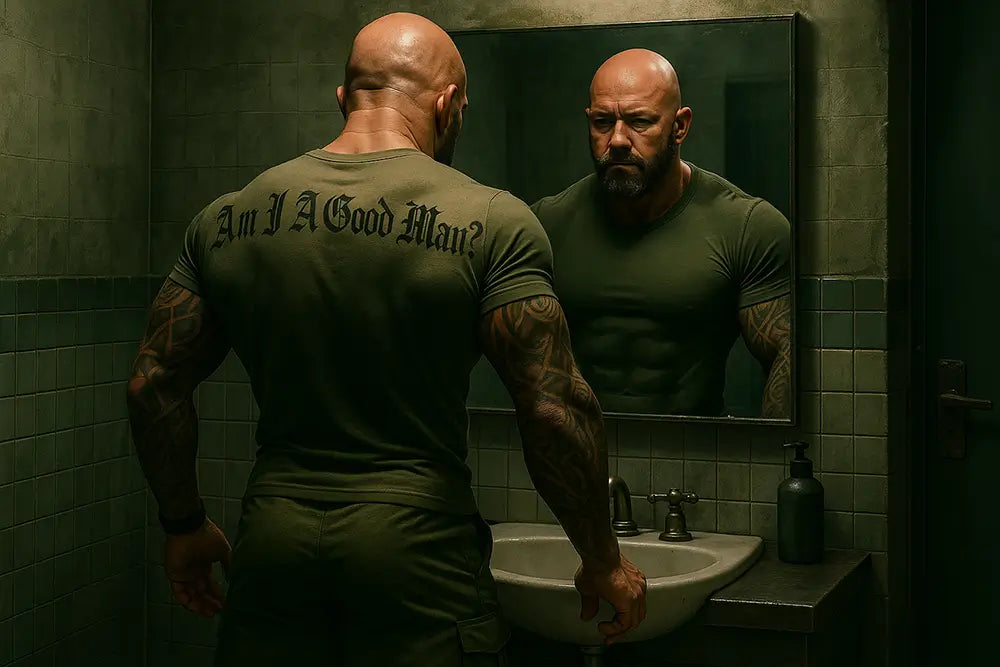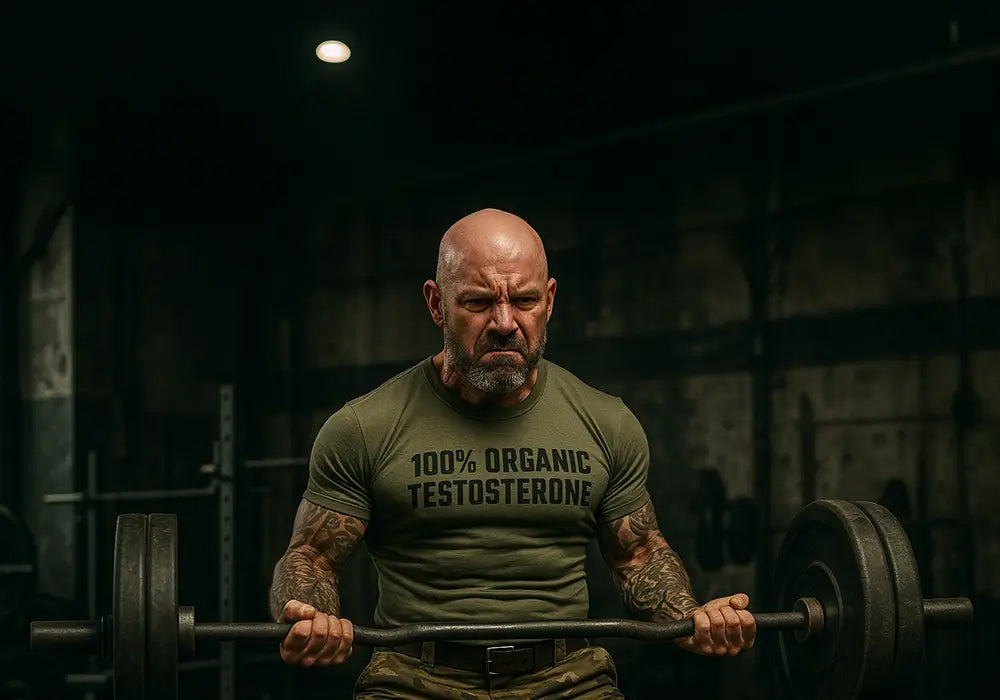The gender and societal gap in the discussion of hormonal health.
It’s likely that most guys reading this are familiar with the term menopause than Andropause. That’s a sad reflection on society that even today, men’s health isn’t prioritised in the same way women’s health is. This is particularly true with regards to the topic of hormonal health.
The fact is that we all have hormones. They fundamentally make us men or women in the first place. Even before we are born, they create the pathway for determining our gender.
For now, let’s look at what we now know are the pivotal final stages in hormonal health for men and women. We will see how this helps us understand men’s health in more detail.
Understanding the Medical Terms.

ANDROPAUSE
Andropause is also called the male menopause and more affectionately, the “manopause”. These terms are used to describe decreasing testosterone levels related to ageing.
MENOPAUSE
Menopause is defined as the time in females when there have been no menstrual periods for 12 consecutive months. No other biological or physiological cause can be identified. It is the end of fertility and the end of the childbearing years.
Also called "the change”.
The Stigma of “Male Menopause”
Let’s start by breaking down the definition.
“Andras” in Greek means human male and “pause” in Greek a “cessation”.
This definition in itself doesn’t help the stigma attached with andropause. What man wants to think of themselves as a man no more? Attaching any labels to the ageing process is bad enough without insinuating that men are any less masculine as they age.
If you look at nature, gorillas only turn into Silverbacks when they are around 13. Which is 41 in human years – just when the andropause is starting!
This time should be the prime of men’s lives. But that isn’t always the case.
Therefore, it’s not surprising that few men want to discuss a decline in their hormones. They want discuss it particularly with other men and definitely not publicly. This in turn, perpetuates the myth that it's culturally taboo for men to talk about the very things that make them men in the first place. They keep this conversation on the low down rather than out in the open where it deserves to be.
Arguing the Facts - Andropause Myths & Facts

It doesn’t help that there is much argument in the medical profession as to whether or not the andropause exists.
This is in spite of the body of evidence and the facts in front of us every day with men suffering with the very real symptoms and issues of testosterone deficiency and andropause - mainly in silence.
Thankfully the tides are turning with the medical profession coming to acknowledge the reality of andropause / testosterone deficiency syndrome. Although in the UK we are somewhat behind in our attitudes than our American friends. They have embraced this issue some time ago.
In fact, in 2023 there was a notable shift in the way the NHS are approaching the male menopause. They does it by announcing they were bringing in policies for the workforce inline with menopause policies. This is a really strong signal that after many years of investment and prioritisation of menopause, the male menopause is being taken seriously.
But this has been met by hostility - particularly in the menopause community with headlines like “Hands off Our Pause!”
Surely men should be supported for bravely talking about a taboo topic?
The Andropause Society believes so strongly in the size of the issue that they are encouraging doctors to treat patients based on their hormonal health symptoms alone. It is even without any testing in recognition of the magnitude of the problem.
Thankfully, there is a growing body of evidence to wholly support andropause. Also, many modern medical professionals are changing their approach to men’s hormonal health. Obviously, the history of menopause is well documented. However, it’s only been in the past decade that it has become a mainstream topic. Of course, this does not mean that prior to it being publicly acceptable to discuss perimenopause and menopause freely, that they both did not exist. Can we assume the same positive journey of awareness for andropause?
What Exactly Is Andropause?
Medical definitions of Andropause also confusingly include testosterone deficiency syndrome, androgen deficiency, and late-onset hypogonadism.
Testosterone Deficiency (TD) is a term most men may have heard of and used more regularly. It is commonly defined as a “syndrome”. Meaning that it presents itself as a group of signs and symptoms that occur together and characterise a particular condition. This in itself is a problem many of the symptoms are commonplace to many other medical concerns. It makes it hard for men to pinpoint in relation to their hormones. Or they simply put it down to ageing and dismiss it to their own detriment. Some men have described andropause as “puberty in reverse”. This helps set a picture both men and women can understand.
TD / Andropause is associated with a decrease in sexual satisfaction or a decline in a feeling of general well-being with low testosterone levels in older men. Now, it is increasing in younger ones. Also, men aged 40 plus can be impacted by oestrogen dominance. Symptoms can range from mood swings, men night sweats, poor sleep, depression, anxiety, and poor muscle tone. One of the most obvious symptoms of oestrogen dominance is gynecomastia. It is more commonly known as ‘man boobs’, which is an enlargement of the male breast tissue.
Testosterone Deficiency Syndrome / Andropause can be diagnosed by your doctor or with an at home blood test. These are now readily available.
When Does It Start To Impact Men?
Historically, it's a hormonal imbalance affecting men, which typically presents symptoms from the age of 40+. Having peaked at around 19/20, testosterone levels decline from around 1% from age of 30. After that it can tail off more significantly from the age of 40 and onwards. However, symptoms of low testosterone can (and appear to be) starting early – sometimes from the mid-30s.

This is particularly common in men with stressful jobs or in men who lead unhealthy lifestyles. It is because an unhealthy way of living is known to negatively impact testosterone levels.
Rising obesity levels and external toxins are also wreaking havoc on men’s testosterone levels. It causes symptoms to present themselves earlier than in your parents’ generation. This negative trend is a concern and needs further exploration.
What Is Menopause?
In women, ovulation ends and hormone production plummets during a relatively short period of time. Although, a lot of women would argue this. Technically, you are considered to have reached menopause when it has been 12 months since your last period. Usually, this occurs naturally in women’s 50’s. In reality this can go on for up to decade as the build-up to the final cessation of periods, called perimenopause. It is more gradual and tends to happen over a sustained period of time.
Peri Menopause occurs during the 40s for most women, but some notice changes as early as their mid-30s. As oestrogen hormones rise and fall, periods grow longer or shorter and women experience ongoing symptoms. These symptoms can be:
- hot flushes
- low mood
- low energy
- fatigue
- weight gain
- skin conditions
- loss of interest in sex (libido)
- vaginal dryness
- brittle bones (osteoporosis)
- joint pain
- poor memory amongst others
Peri menopause can last 4-10 years with the average age of menopause in the western world is 51.
Whilst some women may say good riddance to their monthly cycle which they may have had to endure for 35+ years, often this transitioning time in women’s life can be quite traumatic to deal with - as it can be for men in andropause. It marks a significant time in the ageing process that often leads to negative feelings and low mood. As with men’s hormonal health, symptoms will vary from female to female. Some women will sail through their transition, however many will not. Every year, an estimated additional 1 million women start to experience the symptoms of age-related hormonal change. It’s likely that a similar number of men start experiencing similar signs of declining testosterone levels.
A Closer Look At The Symptoms
Andropause differs from female menopause in key aspects yet has many parallels with it also. The most notable difference is that with women, there is a finite moment where menstruation ceases that all women go through but with men the symptoms may be gradual and potentially not observed at all. There is a definite difference of opinion as to whether all men experience the andropause. If you look at it in terms of age related decline in hormone levels, then the reality is all men will experience andropause as levels of testosterone decline in all men.
However, the extent of decline can vary and the age at which this happens too is varying – even more so with today’s lifestyle factors. Whether or not men acknowledge this or even identify the symptoms due to lack of awareness is quite another matter. When we start looking at the symptoms of both the andropause and menopause, we can start seeing some interesting correlations between men and women. This suggests that there are closer connections to age related hormonal decline across the genders.

Bone Health
Hormonal changes in both men and women can contribute to osteoporosis. When a person has osteoporosis, their bone density decreases, and bones are more likely to break. The risk of osteoporosis rises during and after menopause due to loss of oestrogen and in men from testosterone deficiency / low T levels. Yet because of the dominance of female health in the press, we wrongly only tend to think about this condition as impacting women.
Fertility
This shows some interesting differences between men and women’s hormonal health journeys. The age-related reduction in hormone production, from a biological point of view, relates to our bodies function which is the primary aim of procreating. Whilst menopause does mark the end of women being able to bear children, andropause does not.
Women are well informed about their “biological clocks”. But with medical advances women are able to continue having children safely at much older ages than ever before. Even so, women’s window for non-assisted reproduction is not typically as expansive as their counterparts.
There are many examples in the media of famous older fathers. Formula 1 legend Bernie Eccleston recently became a father again at 89. Rock star Mick Jagger was 73, Hollywood legend Jeff Goldblum 62, and music mogul Simon Cowell 52 to name a few. Undoubtedly, men do experience a decline in their fertility with age, but don’t become infertile as a result of it which is a key difference.However, researchers are increasingly arguing that men have a biological clock, too, even if most men don’t hear it ticking. One of the main people to popularise the idea is Harry Fisch, a New York-based doctor of reproductive medicine who wrote a book called "The Male Biological Clock" in 2005, which describes how male fertility and testosterone levels tend to decline as a man ages and what can be done about it.
The more science and doctors put male and female hormonal health under the microscope, the more similarities and evidence is presented to fully support the notion that Andropause is a transition that most men do indeed go through.
Age Related Hormonal Health Decline and Sex

While fertility doesn't necessarily end for men, andropausal men and menopausal women both do tend to experience reduced sexual drive and function which can have devastating impacts on relationships. In men this may present in lack of morning erections. Testosterone levels replenish daily (unlike women on a monthly cycle) and they are at the highest in the morning. When these decline, men may notice this symptom first after being used to it for so many years, then commonly erectile dysfunction and low testosterone can present itself in older men (although this is affecting many younger men now).
Women report a lack of desire and interest in sex which can be sustained. During intercourse, they can experience pain due to vaginal tissues becoming thinner and more easily irritated from the natural decline in the body's oestrogen levels. As women are used to talking to their doctor about their hormonal health, as it's likely at some previous point they have needed to for other female related medical issues, they are more likely to seek help for these specific symptoms than men.
Men are also more likely to see pharmaceutical interventions than women for their symptoms and not seek the underlying causes for fear of embarrassment in talking about deeply personal problems. This is compounded by the fact that meds like Viagra are now freely and widely available without prescription for men of all ages. In the UK erectile dysfunction is thought to affect up to one in five adult men, 4.3 million in the UK. Like any medication though, the drug can cause side-effects.
How Declining Hormones Impact Mood
In recent times, we have learnt more about the connections between the reproductive hormones and the brain, and how they affect not only women but men as well. Women experience major hormonal shifts during the transition to menopause. At this time, they are 14 times more likely than usual to experience depression. Oestrogen is related to production of serotonin, a mood-regulating neurotransmitter. Fluctuating oestrogen and progesterone levels, plus other factors, cause serotonin production disruption, leading to more mood swings.

The causal relationship between testosterone levels and mood in men is less well documented but appears to impact men equally as much as women but goes less reported. Men are frequently misdiagnosed with depression instead of testosterone deficiency due to a lack of awareness of the symptoms. We’ve all heard of grumpy old man syndrome, which has recently been coined irritable male syndrome. Could this be more easily (and kindly) explained by andropause?
Regardless, both sexes do report unexplained feelings of anger and irritability which can cause problems at work and home. There are also shared symptoms of fatigue, lack of energy and motivation over sustained periods of time. This can lead to a catch 22 situation leading to lower mood and depression.
Weight Gain
Hormonal imbalance is to blame for weight gain in both men and women. It’s a common symptom of both menopause and andropause and causes considerable upset in both sexes about the lack of control they feel over their changing bodies. It’s often more complicated than just involving oestrogen and testosterone. Many other hormones are also controlled by the endocrine system and imbalance of any combination of these can wreak havoc on your metabolism. Oestrogen levels that are too high or too low can cause weight gain in women. High levels of oestrogen in the body can irritate the cells that produce insulin in your body, making you insulin resistant and blood sugar levels rise, leading to weight gain.

In men excess oestrogen (as they have this to – as do women have testosterone) can lead to an additional unpleasant symptom gynecomastia or “man boobs / moobs”. This happens when a man’s ratio of oestrogen to testosterone shifts too far to the female side. In men, rising incidences of obesity are actually causing testosterone levels to decline faster than ever before and at alarming levels.
A study in 2008 found that a four-inch increase in waist size increased a man's odds of having a low testosterone level by 75%. Overweight men produce more oestrogen owing to the extra body fat and the enzyme in our fat cells called aromatase. This converts testosterone, reducing levels in the body. Then the more overweight you are, the more oestrogen you produce and the bigger you get so it’s a vicious cycle. In addition, another key hormone impacting menopause and andropause symptoms is excess insulin. This can cause weight gain and inflammation, by storing too much fat, while too much cortisol can shut down digestion and slow down your metabolism.
Conclusions
We’ve established that both andropause and menopause are hormonal declines caused by ageing. They share similar symptoms at similar ages and both have considerable negative impacts on men and women’s health and can last considerable periods of time. Both subjects are complex. However, it’s clear how crucial hormonal balance is to everyone’s health regardless of gender. What is clear is that there is dire need for more education and awareness about men’s hormonal health challenges in particular. With the negative trend towards declining testosterone levels, interventions need to be presented and sooner rather than later.
Men need better support networks, more hormonal health solutions and for changes in society so that men are able to discuss their hormone challenges freely and without judgement or fear. We can all play our role in this by simply understanding that most of us can, and do, actually walk a day in each other's hormonally unbalanced shoes at some point of our lives. Being able to relate to each other’s experiences will undoubtedly help us have more empathy for what can be difficult periods in men and women’s lives.




Share:
What men need to know about testosterone and why.
Dictionary of Mens' Hormonal Health - Part 2